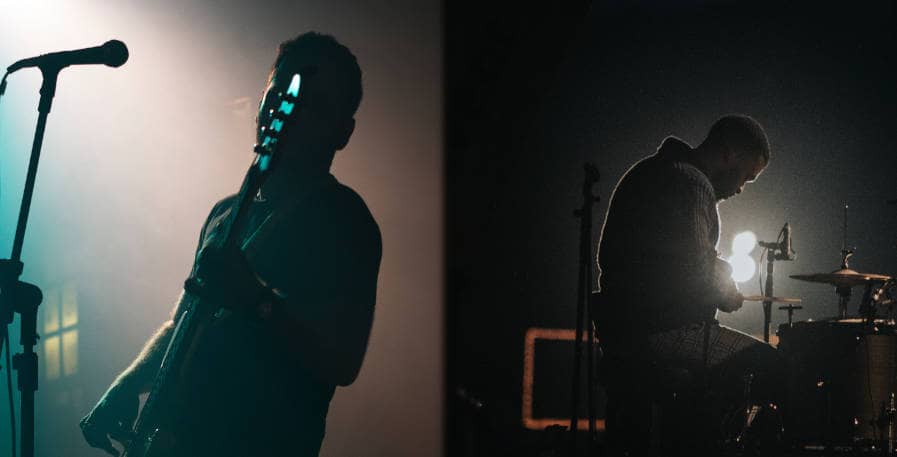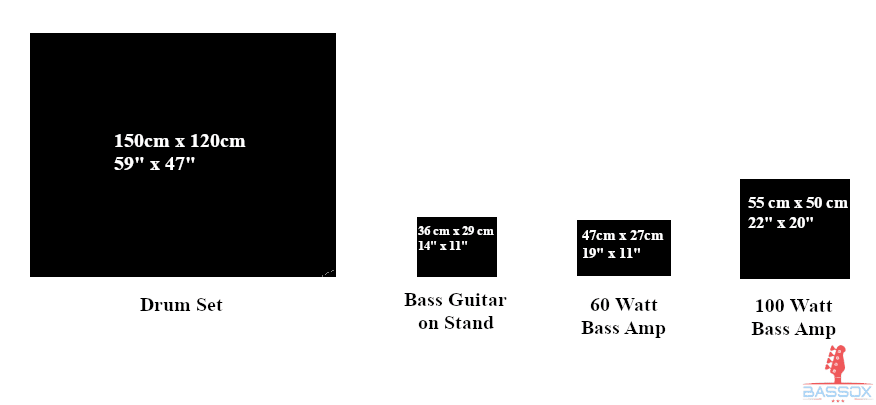The drums and the bass guitar are two closely related instruments. Any band worth their money has a bassist and drummer that are in synch and play off each other. Together they make up the rhythm section in the band, and some even like to think of them as a single instrument.
However, drums and the bass guitar are two vastly different instruments to play. They require different skill sets, and both have their unique perks and downsides.
As many of these aspects of playing the two instruments are often overlooked, I decided to write this article.
I`m going to show you every noteworthy similarity and difference between the bass and the drums. This way, you can make an informed decision on which of the two instruments you should play.
As a result, you won`t have to deal with any unexpected hassle once you commit to playing either of the two. You will also know what it entails to play both instruments, which will make you better equipped to work together with other bassists and drummers.
Key Differences
Aside from their obvious differences in look and sound, there are many less obvious differences in what it means to play the drums and what it means to play the bass.
Thus, here is a side-by-side comparison of the key aspects of both instruments:
| Bass Guitar | Drum Set | |
| Instrument type | Melodic | Percussive |
| Cost of Entry-Level Instrument: | $100-$250 | $400-$600 |
| Cost of intermediate instrument: | $500-$1200 | $700-$2000 |
| Part of what section in a band: | Rhythm and melodic section | Rhythm section |
| Demand in bands: | High | Medium |
| Played with: | Fingers, pick, thumb | Sticks, brushes, mallets |
| As a composing tool: | Adequate | Poor |
| Main task in a band: | Connect rhythm and melody, provide groove, and fill in low-end frequencies | Provide rhythmic foundation, keep time and control the pulse |
| As a solo instrument: | Adequate, but mainly played as part of a band | Adequate, but rarely played mainly as such |
| Importance in bands: | Staple instrument in most genres of music | Necessary instrument for playing most forms of music |
| Needs to be tuned: | Regularly | Preferably every 1-2 weeks, and before live shows |
| Time to tune: | ~1 minute with a tuner or a good ear | ~15-30 minutes. Quicker as you develop an ear for it. |
| Physically demanding: | Somewhat demanding | Very demanding |
If any of the above features of the instruments sound like dealbreakers, this can be a big indicator of which instrument will suit you the best.
Below, I`ll go more in-depth about some of the above points, as well as some more nuanced differences. This way, you will get a clear idea of what these differences will mean for you if you decide to become a bassist or a drummer.
Popularity
Whether you play the bass or drums, you generally won`t struggle to find people to play music with. This holds especially true in genres where 1 or 2 guitars are common, as guitarists outnumber drummers and bassists.
However, it will be easier to find people to play with as a bass player than a drummer. While the bass is a staple instrument in most genres, it is far less popular than every other common band instrument. As a result, bassists are always in demand.
Thus, a drummer might need to put in more work than a bassist to find a band. It will however not be overly difficult to find people to play with for either, and there is not an excessive surplus of drummers.
To make it as easy as possible to find people to play with, play the bass guitar
If you don`t mind a bit of occasional competition or intended to play alone, play the drums
Difficulty
While the bass and drums require completely different skill sets, they have a similar learning curve.
It`s not uncommon for bassists to be able to play simple 8th note grooves in a manner of days. Drummers also tend to be able to play simple rock grooves and hold down a basic beat in a similar time frame.
Thus, both instruments can be played at an adequate level much faster than instruments such as the piano, violin, or vocals. This makes both the drums and bass beginner-friendly instruments that you can play some full-length songs on quickly.
However, they are both instruments that take a long time to master and play proficiently. Both require you to develop a sense of groove, rhythm, and pulse. Advanced bassists and drummers also play dynamically and articulate notes with different intensities. This requires great control of the instrument. Because of this, both the drums and the bass are difficult to play at a high level.
With consistent and methodical practice, the bass can be played at a professional level after 2-3 years. This is the best-case scenario, and even with consistent daily practice, it will take significantly longer for many.
The same goes for the drums, as they require a lot of knowledge and experience to be played well. Thus, while the learning process can be sped up, it will generally take several years before you can realistically expect to become proficient at the instrument.
For an instrument that is easy to pick up, but difficult to master, play either the bass or the drums

Physical demand
The drums are one of the most physically demanding instruments out there.
How demanding the drums are on you physically also depends a lot on what genre of music you play. Four on the floor and slow jazz grooves, will for example be significantly less exhausting than playing thrash metal or punk.
It’s harder to play drums than guitar, physically.
J Mascis – Dinosaur Jr. frontman
Thus, how physically demanding the drums are to play ranges from medium to extreme. However, even at their least demanding, they are still more taxing to play than the bass.
The physical demand of playing the bass mainly comes from having the instrument strapped onto you for hours at a time. As bass guitars weigh from ~8.5lbs (4kgs) and up, hour-long rehearsals or gigs can start to take their toll on your back. Bass guitars are also taxing on your fingers, and bassists commonly develop blisters.
If you want to use your whole body to play a physical instrument, play the drums
If you dislike the idea of playing a physically taxing instrument, play the bass
Writing music
As the drums are percussive instruments they are unfit for writing full songs. Thus, if you are interested in writing your own songs, it is generally preferable to play a different instrument.
The bass guitar is a melodic instrument and is thus more fit for writing music. While uncommon, I write most of my music on my bass guitar. It is also possible to write parts for other instruments on it and to use it to structure complete songs.
However, there are other instruments that lend themselves better to writing music, such as the piano and the guitar. Thus, if you are mainly interested in writing your own music, I recommend checking out my article on Bass VS Piano.
While neither instrument is ideal for writing music, the bass lets you do so, while writing anything but drum parts is not feasible on the drums.
If you are looking to write your own songs, play the bass
If you enjoy adding your own style to songs without writing them, play the drums
Rhythm VS Melody
The main difference between the bass and drums is that the bass is a melodic instrument, while the drums are percussive.
As a result, many musicians are naturally drawn toward one or the other. Some will find themselves air-drumming or beatboxing to a song and be intrigued by beats and time signatures. Others will find themselves humming along to melodies, and be intrigued by harmonies and key signatures.
This is a big deal, as your instrument choice dictates whether you can express how you naturally pick up on music or not. The drums will allows you to focus on beats, rhythms and fills. As a bassist, your focus will be on providing a harmonic foundation, and adding melody to your grooves.
Oh, and if you fall into both camps, that`s even better. It means you are likely to enjoy playing either instrument. You will also be great at staying in synch with the other members in a band, regardless of whether you play the drums or the bass.
If you are more drawn toward rhythms and beats, play the drums
If you are more drawn toward melodies and harmony, play the bass

Instrument cost
In general, the drums are a more expensive instrument to play than the bass guitar.
The cost of a decent beginner bass tends to be between $100-$250, though most will be on the more expensive side of this range. Small basses intended for children up to 12 years of age and second-hand basses can be found even cheaper.
An entry-level acoustic drum set will generally cost somewhere in the $400 to $600 range. For children under the age of 12, junior drum sets can oftentimes be found in the $150 to $200 price range. There is also the option of getting an electronic drum set, which tends to be slightly cheaper than an acoustic set of similar size.
When comparing intermediate instruments, the instruments tend to become more similar in cost. However, there is a much wider range in cost when upgrading to a second instrument. Approximately, a good intermediate drum set will cost between $700-$2000 and a bass will cost between $500 and $1200.
There is also the option of adding pieces to a drum set. This is a variable but noteworthy additional cost than can make the total cost of the instrument significantly higher. Drum heads also need to be replaced when they get worn down, which can cost $100-$200 when replacing every head of a small kit.
With bass guitars, you will need new strings occasionally, which generally cost $20-$30. Basses also need to be set up occasionally or when permanently changing tuning. This can be done at home without additional cost. If you prefer having a luthier do it for you, the average cost of a bass setup is $63.18
For the lowest instrument and maintenance cost, play the bass
If you enjoy gradually upgrading your instrument and adding pieces to it, play the drums
Size
A medium-sized drum kit takes up about 20 square feet (or ~1.9 square meters). With bigger sets, or when adding pieces to it, it can in time take up a whole lot more. Electronic sets will generally take up less space than acoustic sets.
As bass guitars are vertical and can be kept on stands or hung on the wall, they take up less space. Small beginner bass amps don`t take up noteworthy floor space. However, if you start out with or upgrade to a 60-watt amp, these can take up ~20×10 inches of space. 100-watt amplifiers can take up ~20×20 inches.

Thus, floor space needs to be accounted for when getting a drum set, whereas this is usually only a concern if you get a big amplifier for your bass.
If you don`t have enough floor for a drum kit, play the bass
If you prefer having a designated area to play your instrument, play the drums
Noise
Acoustic drum sets are loud. Specifically, up to 130 decibels which is enough to cause permanent damage to the ears. This means that the drums can`t be played just anywhere without the proper precautions.
Thus, drum sets are often played in soundproof rooms and designated areas. Drummers also often need to take steps to dampen their sets in order to not be too loud.
If this is not attainable, an electronic drum set can be a great solution to the problem. It will make some noise as you are hitting the set with sticks. However, it is so much quieter than an acoustic set that you do not have to be concerned about playing in a soundproof room or disturbing your neighbors.
With an amplifier, bass guitars can get loud too. However, bassists commonly play with headphones on, connected either to their amplifier or to their PC. Thus, while loud, it is easy to not have this be of disturbance to other people. It is also possible to play the bass without an amp.
If you are looking for an instrument that will not make a lot of noise, play the bass or an electronic drum set
If you want to rock out and practice at full volume, play the drums

Leading the music
It is common for one member of a band to set the tempo and groove of a band as the rest of the band follows. In some bands, the drums decide the pulse, in others it`s done by the bassist. Sometimes, it is done by neither. When the drummer and bassist are able to lock in well with one another, it can even feel like the band is following both of them.
More often than not though, the rest of the band follows the drums.
Drummers commonly count up the song, and keeping time is generally easier when following a percussive instrument. This holds especially true for beginners, and in newly formed bands.
“A band is only as good as its drummer.”
Fred Armisen – Late Night with Seth Meyers House Band
While less common, some bands also follow the bassist.
Bass lines provide the groove and feel of a song that the rest of the instruments build their parts upon. Thus, it can feel intuitive to add vocals, guitar, and keyboard on top of it.
Harmonically, this has the added benefit of the bass providing the root note. However, it can be more demanding to follow the pulse of a bass line than a drum beat.
In more experienced bands, it gets more common for all the members to follow one another. Thus, while you will often lead the music as a drummer, and occasionally as a bassist, this will become rarer as you progress and start playing with more experienced musicians.
What genre of music you play will also play a part in what instrument a band follows. In Rock and Pop, it is common to follow the drums. Jazz and Blues require a different form of pulse, which puts more pressure on the bassist to not strictly follow the drums.
If you want to dictate the pulse of the music when playing with a band, play the drums
If you want to lock in with the other members of a band without leading the music, play the bass
Conclusion
As you can tell by now, there is a lot that goes into choosing between playing the bass and the drums.
In many ways, the two instruments fill a single role together in a band when they work together as a rhythm section. However, how they go about fulfilling this role differs greatly, and they also fill their own individual roles on top of it.
As a drummer, you are taking on a more physically demanding role and oftentimes the band will follow your lead. It is possible to lead the music as a bassist too, but more often than not you will focus on being in synch with the other members of a band, rather than them following you.
Playing the drums is somewhat more expensive than playing the bass. It also offers you to gradually upgrade your set. Upgrading the bass generally requires you to switch out individual parts which can be cumbersome, or to get a new instrument altogether.
A drum set takes up a significant amount of floor space and can get extremely loud. This requires you to have a designated practice space, that accounts for the noise. The bass takes up minimal floor space and slightly more if played through a large amp. It can be played through headphones or unamplified to not make as much noise.
Drummers are in bigger demand than guitar players, but not in as big of demand as bass players. The bass is also a more fitting choice if you want to write your own music. However, instruments such as the piano and guitar are generally preferable for this purpose.
The biggest indicator of whether the bass or drums are a better fit for you is how you pick up on music.
If you listen to and remember beats, rhythms, and time signatures, you might be naturally more equipped to be a drummer. If you find yourself picking up on the bass line and how it adds both harmony and rhythm to the song, you are likely to find the bass to be a natural fit for you.

